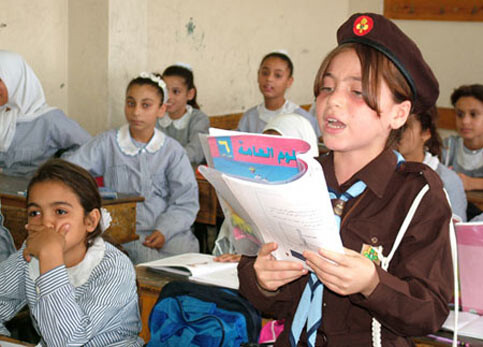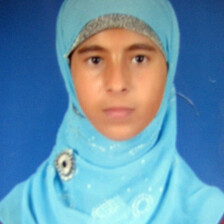United Nations Relief and Works Agency for Palestine Refugees in the Near East 27 December 2005

Amal leads the morning parade at Shatie Elementary School. Dressed in her brown uniform and beret she is at the fore as, behind her, a thousand Gazan schoolchildren line up neatly in rows, clapping and chanting. After the parade she is in charge of ensuring they all file back quickly into their classrooms.
This daily ritual is representative of the kind of order school brings to the lives of children living in Gaza. Amal is eleven years old; her parents, like those of many other children at Shatie, which caters solely for refugee children, are impoverished and unemployed. The camps in which Amal and most other students live are crowded, amongst the most densely populated places on earth, with many families having nine or ten children. The constant threat of violence that hangs over Gaza, even since the disengagement, pervades the camps. This, coupled with the lack of open spaces, means that the opportunity to play and interact freely with other children is a luxury.
“I wake up happy in the morning because I am going to school” Amal says as she weaves her way through the throngs of children, looking for her younger sister Yasmin, who is six, and has just begun her first year of school. Yasmin eagerly agrees, as Amal heaves her onto her lap: “School is much better than home. I have lots of friends here and I’m learning reading, writing and songs.”
Shatie School is one of 180 UNRWA schools in the Gaza Strip. UNRWA covers all of the schools’ costs, including maintenance, salaries, books and the expense of support materials needed to teach the classes offered in Arabic, English, Science, Maths, Religion, Computing and Sport. Its students, aged from six to twelve, are from the nearby Beach Camp, just outside Gaza City. As the population of the camp rapidly grows, so does the number of children needing education. In fact, there are so many children that the school has to be divided into two shifts. There are more than one thousand children in each session, and the shift system means that, effectively, two schools are taught every day in one building. At lunchtime, children and the teachers swap, and a new session begins.
Despite the growing numbers and logistical challenges UNRWA turns no child away. “We can’t say ‘no’ to anyone” states headmistress Almad Houn, emphatically. “I have all the records and I personally check with the families to make sure that no one is missing out on their education.”
Almad is particularly proud of the girls’ volleyball team; a glass cabinet in her office is crammed with trophies won by the school. Twelve-year-old Ghadeer is one of the team’s stars. She began playing two years ago, and since then the game has become a passion as she has propelled the team to victory again and again. “The secret of my game is a top trainer” confides Ghadeer, modestly. “Outside school there is little space to practice but, because I love volleyball so much, I play against the wall whenever I can. It’s an unbelievable feeling to win.”
The pressure Ghadeer puts on herself to win at volleyball is equaled by the pressure on her have a successful career. Her family, like many others, suffers from the lack of opportunity for unskilled workers living in the tiny Gaza Strip, and has no income. To Ghadeer her sport and her future career are not compatible; there are no professional sports players in Gaza, and so sport is not something she aspires to. Ghadeer wants to study medicine when she leaves school. Her grades are some of the highest in her class and so her ambition may one day be realised.
Almad Houn says the key to Ghadeer and the other students’ success is the happy atmosphere in the school. “The way we deal with the kids makes a big difference. They feel it, they touch it. We have created an environment where the children feel at peace.” Almad admits that there us little she can do to prevent children witnessing the violence that plagues Gaza, yet she believes the school plays a vital role in forging a microcosm in which the children can escape. “They live with these conditions, unfortunately, but at least we can lessen their exposure.” A hand written slogan has been scribbled in English and Arabic on her wall: We draw love, not terror. “This is the school motto”, explains Almad. “We want to stop violence and encourage love.”
Twelve-year-old Najah lives with the violence around her home at the Beach Camp. Since her brother was killed in the neighbouring streets, she has not dared to play outside. “I feel safe at school”, she says. “They teach non-violence, that’s why I like it. I’m afraid outside, but at school I’m not scared anymore.”
Najah’s family is one of the poorest in the camp, their situation exacerbated by the depression her father has lived with since the death of his son. Formerly a fisherman, Israeli imposed fishing limits has meant a huge decline in the industry. He has now given up hope of ever finding a job. Najah’s mother too is exhausted, with eight young children to take care of and nothing to offer them.
“Things are difficult for me at home”, says Najah. “My father can’t even give me a few shekels to take to school.” The family’s circumstances mean that they are eligible for UNRWA’s school welfare program, which donates school uniforms and other school essentials to the poorest refugees. This supplements the assistance the family also receives from UNRWA in terms of flour, sugar and other food stuffs. “I love maths and hope I can become a maths teacher one day. With this help I can carry on studying.”
Related Links
